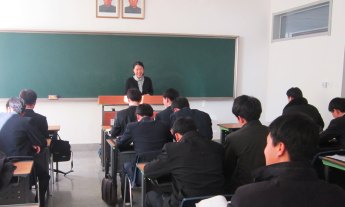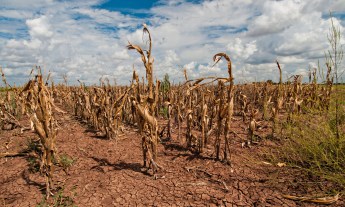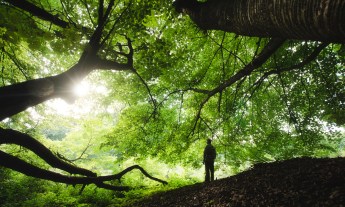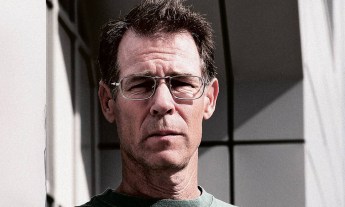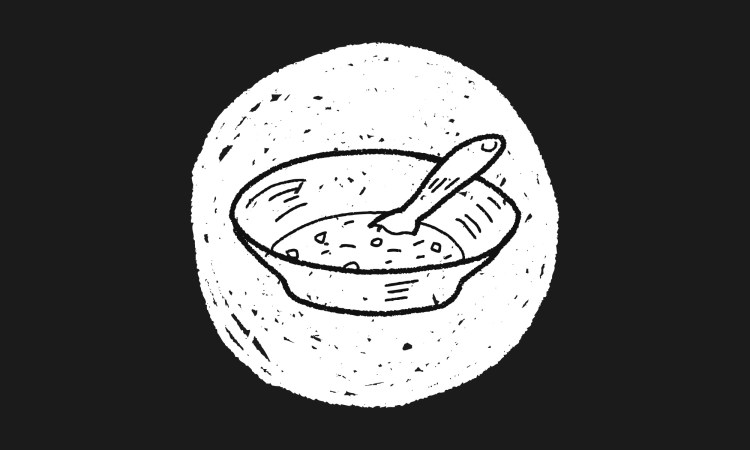
Two decades ago, millions of North Koreans faced widespread famine, and many families would do just about anything to feed their children. In an edited excerpt from his memoir Under the Same Sky, Joseph Kim describes life during the famine — and one haunting consequence of his hunger.
The famine pursued us. There were days when all we had to eat was a handful of wild mushrooms in water. So we decided to travel to my maternal grandmother’s, where we hoped to find food.
Usually, my mother would have planned a trip like that for months, since it took all that time to notify the person you were going to see of your arrival, to get train tickets, and to tell the school your kids wouldn’t be attending. But we didn’t have normal lives anymore; your schedule was decided by what you needed to do to get food that day. It was frightening how these major decisions were made the night before, in a moment of panic.
My father told us he would be staying behind. My parents made it seem as though he had to work, but I knew they were separating again. Another mouth to feed wouldn’t be welcome at my grandmother’s, and my father’s pride would be hurt by showing up at his mother-in-law’s house, destitute.
We’d sold our good clothes and were wearing the only outfits we had left. Honestly, we looked like vagrants.
The morning of our departure, my mother gathered our bags by the front door, one big one for each of us. My father watched us, his hands behind his back, his face lined with sadness. I’d been calm until the last moment, but as we said our goodbyes, I felt a wave of fear wash through me. “But … but what if we never come back here?” I said to my mother. “What if we die on the way there?” I don’t know what made me say such an awful thing; perhaps it was the tofu or boiled egg that every family is supposed to eat before leaving on a journey. (Eggs roll fast, which means the trip will go quickly, and tofu is perfectly square, which means everything will go according to plan.) Since we didn’t have any tofu or eggs to eat, I got nervous and blurted out the words about dying.
My mom erupted. “Are you crazy? Why would you say such things?” I looked at her, stunned by the vehemence in her voice. But nothing about the journey was right. Usually you wear your best clothes and set off with a warm meal in your belly. We were doing none of that. We’d sold our good clothes and were wearing the only outfits we had left; I was dressed in a dark coat, dark slacks, and a soiled, much-washed white shirt. Honestly, we looked like vagrants.
At the railroad station, huge crowds were waiting for the next train. My mother managed to get us on the second one that came through — when she wanted to be, she could be fierce. There was nowhere to sit down, so we stood pressed up against the people we’d boarded with.
The trip should have taken an hour or two at the most. We arrived six hours later.
The dumb thing I’d said at home immediately cursed the journey. As the train got under way, moving down the track at a snail’s pace, the car swayed and someone dropped a huge suitcase on my foot.
“Yow!” I cried. It felt as if the bones in my foot had been smashed. My mother scolded the man with the bag, but she could barely reach me through the bodies stacked inside the car. I couldn’t even reach down to massage my foot, but howled and wept as the other passengers looked at me with blank faces.
The trip should have taken an hour or two at the most. We arrived six hours later, pulling ourselves through the mass of bodies at the Hokseung station.
The wind swept across the train platform and instantly I was cold. On past visits, we would wait for the local train that branched off and took us very close to Grandmother’s house. But we saw no one waiting on that platform. “That train doesn’t run anymore,” an old man told us. My mother looked at him anxiously. “What? But we have to get to Undok.”
“Then you better start walking.”
Our grandmother’s house was a couple of hours away on foot. My mother’s face grew grim and she picked up our suitcases and marched out of the station. My sister, Bong Sook, and I followed, me limping on my smashed foot.
“Mother, I’m hungry,” I said. Outside the station there was a street with private houses that doubled as restaurants. One house would sell soup and radish kimchi, the next corn and bread. We stopped at one and bought a bowl of soup with some kimchi, along with a couple of potato side dishes. We stood there on the road and dug in: the food was delicious, little globs of fat floating on the soup’s surface.
In two minutes, the food was gone. We felt refreshed and began the long walk. We arrived at our grandmother’s house around midnight and could hear the TV as we walked up the path. There were two houses in my grandmother’s compound: a big one where my aunt and uncle lived, and a second, much smaller house for Grandmother. We hoped they had enough to feed us.
Grandmother’s expression was one of fear and disgust. Was it wrong for us to have eaten something?
We knocked on the door of the big house and my aunt and uncle let us in. Exhausted, we dropped onto our sleeping mats. The next morning, Grandmother greeted us, her expression a mix of love and worry. She was in her early eighties, tiny, stooped, and skinnier than I remembered.
Mother was telling Grandma about the journey: the packed cars, the slow train, the local that didn’t run anymore, the restaurant food that gave us the strength to walk.
Grandma’s face froze. “Which restaurant did you stop at?” she asked.
“The second one from the station,” my mother said. “Why?”
Grandmother’s expression was one of fear and disgust. Bong Sook and I looked at each other. Was it wrong for us to have eaten something?
My mother and grandma disappeared into the other room, where I could hear them murmuring.
“Bong Sook, what’s wrong?” I asked.
“I don’t know,” she said. “Go play with your cousins.”
I was happy to, but Grandma’s reaction still bothered me. I ran off to find my cousins.
It was a couple of days before one of them spilled the beans. There had been rumors going around for months about a restaurant by the railroad station. They said that the owners of the place had been kidnapping homeless people and travelers and killing them. They would then chop them up, strip the meat from their bones, and add it to their soup.
“Which restaurant?” I asked quickly.
“Some say the fourth from the corner,” my cousin said, watching my reaction closely. “Some say … the second.”
I felt my stomach do a flip.
“Cousin,” she said, “what shape were the fat bubbles?”
My tongue felt covered in greasy fur. Had I eaten a human being? If I did, I was now a cannibal. And what was worse, the soup, I remembered, had been delicious.
“What shape?” she repeated.
“Why does it matter?”
She looked at me hopelessly.
“When you boil meat, the fat rises to the surface.”
“Yes, yes,” I said. “I know that.”
“OK,” my cousin said. “But were they circles or triangles?”
“What kind of a question is that?”
She frowned impatiently. “Fat from pork, beef or chicken forms a circle,” she said, as if she was repeating some famous science equation, like the law of gravity. “Fat from a human …”
“Triangles?”
“Yes,” she said. “Triangles.”
Folk stories, rumors and superstition were all North Koreans had.
I racked my brain to remember what the fat blobs looked like. I could see the heavy wooden bowl and the few corn noodles floating half submerged in the cloudy soup. I could see small chunks of vegetables and the tiny bits of yellowish fat on the surface. But no matter how hard I closed my eyes, I couldn’t for the life of me remember the shape.
When I saw Bong Sook, we talked softly about the soup that day.
“Are you sure there were no triangles?” I asked.
“No,” she said. “There weren’t.”
But the truth is, we couldn’t remember. Some days, I would say to myself, Who knows if the circles and triangles are even true? But folk stories, rumors and superstition were all North Koreans had. There was no authority to consult to see if you’d consumed a human being or not.
This passage is adapted from Under the Same Sky by Joseph Kim with Stephan Talty, with permission of Houghton Mifflin Harcourt. Watch Joseph’s TED Talk, The family I lost in North Korea. And the family I gained.
Featured image courtesy iStock.








